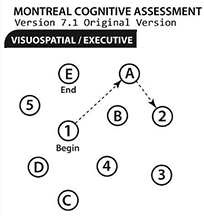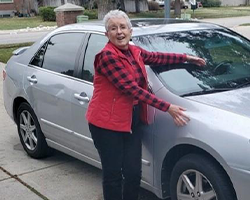How to Know When It's Time to Take/Give-Up the Car Keys
 My husband’s ability to drive gradually declined. Because I watched it happen to him,
I’m hoping I’ll recognize it when I’m no longer a safe driver. However, since most
people don’t, I’ve told my kids that when they think my time has come to give up the
keys, I will do so—maybe not happily, but willingly. We’ll see if that really happens.
I’ll give them a copy of this article, so they will have it in writing.
My husband’s ability to drive gradually declined. Because I watched it happen to him,
I’m hoping I’ll recognize it when I’m no longer a safe driver. However, since most
people don’t, I’ve told my kids that when they think my time has come to give up the
keys, I will do so—maybe not happily, but willingly. We’ll see if that really happens.
I’ll give them a copy of this article, so they will have it in writing.
“I could still drive!”
When my dad was 92+ and still living at home, he said frequently, “I could still drive,
but my kids took away my car!” Actually, he asked my brother to sell the car while
he was in rehab recovering from his sixth bout of aspirational pneumonia and was told
he might not be able to go home. He hadn’t driven for quite a while. He did recover
and it didn’t take him long to regret his decision to sell the car. He would still
drive his wife’s car to church, even though he had trouble walking, seeing and hearing.
She wasn’t a safe driver either and had a few fender benders on her record. But it
was up to her kids to take away her keys.
Causing accidents isn’t the only way to tell if we or a loved one should no longer be behind the wheel. If in 2019 you saw a short, bald, elderly man driving a huge Mazda below the speed limit, it could have been my husband, Dennis. One of the first changes I noticed about his driving was that he never knew what the speed limit was. Why? Because he only looked straight ahead and couldn’t process more than one thing at a time. He couldn’t remember seeing a speed limit sign.
 Tests to Determine Driving Skill
Tests to Determine Driving Skill
There’s a common cognition test that can determine this without being anywhere near
a car. The person being tested is given a paper that looks like the one on the right
and told to connect the numbers and letters in numeric and alphabetical order without
lifting the pencil from the paper. I learned later how this relates to driving ability.
To complete the test correctly, you have to keep two things in mind at the same time—the
last number and the last letter you touched. Even though Dennis “cheated” by practicing
repeatedly at home, he couldn’t complete it.
Another test he was given by a physical therapist (PT) was to stand in front a board with flashing lights that responded to touch. When lights flashed on one at a time, Dennis was supposed to touch them using either hand but keeping up with the machine. He couldn’t do that either.
He also had a difficult time staying completely within a lane without frequently going at least a little over the lines on the street. He had a couple of fender benders caused by not moving into the right turn lane soon enough and then forgetting to check his blind spot. As we age, it becomes more difficult to turn our heads and look back quickly, so changing lanes in any direction can be less safe.
Both my dad and my husband developed difficulty walking at a normal pace and lifting their feet up high enough to prevent tripping over things. This can translate to whether one is able to move quickly between the gas and the brake pedals. We’ve all heard of accidents where an elderly person steps on the gas instead of the brake. Vision can also change as we age. I did notice that my night vision was becoming unsafe because of the halo effect around all the headlights and traffic lights. Cataract surgery fixed that, but older drivers are still encouraged not to drive at night.
Dennis was told by his PT that he should have a road test, but before the clinic dared
let him drive a real car, they gave him other tests for cognition and reaction time
and also tested his skills in a driving
simulator. They decided that they could risk it, and he passed the road test, but
just barely. The person observing him reported all the same problems I had noticed
and said the DMV would be notified that he shouldn’t drive at night, on the freeway,
during high traffic hours, long distances from home, or to any place he hadn’t been
to before.
 Cars that Can Make Driving Safer
Cars that Can Make Driving Safer
Near the end of 2020, I decided I should give up my 2004 Honda Acord for a 2020 with
all the safety features that could be helpful to an elderly driver: warnings and prevention
for lane deviation and getting too close to the car in front, a backup camera, automatic
slowdown as needed in cruise control. Letting go of my 2004 Honda Acord for a 2020
was still a difficult parting. I’ll probably have the new one until my kids say it’s
time to stop driving all together.
Others Who Can Take Away the Keys
If you know you’re in for a fight over the keys when your elderly spouse or parent
is no longer a safe driver, you can get someone else to do it for you. You can alert
the DMV or have a doctor or a PT do it via a form that states the person should not
be allowed to drive. Dennis’s license expired on his 82nd birthday, just months before
he died. He was still driving to the Cottonwood Rec Center only about a mile from
our home to use the gym. I took him to the DMV to see if they would renew it. (He’d
tried to go himself but got lost.) He filled out the form and passed the eye test,
and that was all they seemed to care about. He was issued a temporary permit.
However, about a week later, after the DMV had actually read the form on which he said he’d been diagnosed with Alzheimer’s, we received a letter saying that they would need a doctor’s signature on the form to qualify for a license. His PCP refused to sign it, but when I said he only wanted to drive to the gym, she suggested asking his neurologist. He signed it with exclusions, but before I could turn it in, Dennis suffered a mini stroke that took away much of his self-care ability. When I reported this to the Neurologist, his first request was for me to tear up the consent form, which I happily did.
Accidents Waiting to Happen
Giving up driving means the end of a big chunk of independence for both the driver
and those who will be responsible for taking him or her everywhere now. It’s a difficult
decision for all concerned, but a serious accident could be a tragedy of even greater
proportions.
